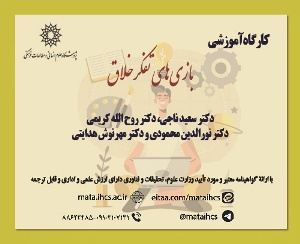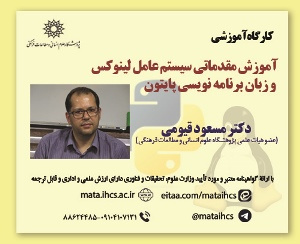العولمه الثقافیّه والتّهجین اللغوی فی الرّوایه الجزائریّه والإیرانیّه روایتا مملکه الفراشه وعشق وچیزهای دیگر أنموذجاً (مقاله علمی وزارت علوم)
درجه علمی: نشریه علمی (وزارت علوم)
آرشیو
چکیده
لقد اتسعت رقعه تأثیر العولمه الثقافیّه عقب الثوره المعلوماتیّه فی العقود الأخیره ممّا ترکت لمساتها فی شتى مناحی الحیاه ومن ضمنها الناحیه اللغویّه حیث أدّى الأمر إلى تفشّی ظاهره التّهجین اللّغوی فی مختلف المجالات العلمیّه والثقافیّه بما فیها الروایه الإیرانیّه والجزائریّه. نتعرّض فی هذا المقال لإشکالیه العولمه الثقافیه والتّهجین اللغوی فی روایتی "مملکه الفراشه" و"عشق وچیزهای دیگر" لکونهما نموذجتین بارزتین من الأعمال السردیّه الهجینه وذلک فی ضوء نظریّه العولمه التحولیّه وعلى أساس المنهج الوصفی والتحلیلیّ المقارن. تدلّ النتائج على أنّ التهجین اللغوی الناتج عن العولمه الثقافیه ظهر فی الخطاب السردی لروایتی مملکه الفراشه وعشق وچیزهای دیگر بنوعیه الاسم والجمله غیر أن التّهجین اللّغوی عن طریق الاسم هو أبرز نوع التهجین الذی تجلّت مظاهرها فی هاتین الروایتین. حسب بیانات التحلیل الإحصائی، مکوّن تغییر أسماء الشخوص وتشویهها بإجمالی 33٪ وتکرار 465 هو المکوّن الأکثر تواجداً وتوظیفاً فی روایه مملکه الفراشه ثم یأتی مکوّن استحضار أسماء الأعلام والمشاهیر الأجانب بإجمالی 25% وتکرار 352. أما بالنسبه لروایه عشق وچیزهای دیگر، مکوّن أسماء نمط الحیاه بإجمالی 49٪ وتکرار 220 احتلّ المرتبه الأولى وهو المکوّن الأکثر حضوراً واستخداماً فی هذه الروایه، ثم یلیه مکون أسماء الشّخوص الهجینه بإجمالی 27% وتکرار 122. کما یظهر البحث أنّ الاختلاف الأساسی بین هاتین الروایتین بالنسبه للتهجین اللغوی یکمن فی نوع اللغه المستخدمه ثم کمیه تهجین الأسماء من قبل الکاتبین حیث "الأعرج" کان الأکثر حرصاً على استخدام اللّغه الفرنسیّه وتهجین أسماء الشّخوص وتشویهها بینما اقتصر "مستور" على توظیف الإنجلیزیّه فحسب وهو لم یکن بقدر الأعرج حریصاً على تغییر أسماء الشّخوص وتشویهها.Cultural Globalization and linguistic creolization in Iranian and Algerian Novels: The Case Study of the novels 'Eshgh va Chizhāye digar' (Love and Other Things) and 'Mamlakat al- Farāsha' (Butterfly Kingdom)
This research in the light of the developmental globalization theory and on the basis of the descriptive, analytic and comparative method, studies the problem of globalization and linguistic creolization in the novels ' Mamlakat al-Farasha ' (Butterfly Kingdom) and ' Eshgh va Chizhāye digar ' (Love and Other Things), because these are two examples of Iranian and Algerian narrative works that reflect more clearly the phenomenon of linguistic creolization. The results indicate that the phenomenon of linguistic crealization is caused by cultural globalization manifested in the narrative discourse of the novels Eshgh va Chizhāye digar and Mamlakat al- Farasha , in two types of nouns and sentences, but the creolization via nouns is the most prominent type of linguistic creolization which is manifested in these two novels. According to the data of statistical analysis, the component of change and distort the names of the characters with a sum of 33% and a frequency of 465, is the most used component in the novel ' Mamlakat al-Farasha '. Then, comes the component of recall and association of the names of famous foreign celebrities and characters with a sum of 25%, and a frequency of 352 leis in the next rank. But in the novel ' Eshgh va Chizhāye digar ', the component of the names of lifestyle with a sum of 49%, and a frequency of 220 is the most used and most frequent component, then the component of changing and distorting the names of the characters lies in the next rank with a sum of 27% and a frequency of 122. This research shows also that the main difference between these two novels from the viewpoint of the linguistic creolization lies in the type of foreign language used, as well as the use of changed and distorted names by the writer, so that Aʽraj emphasized mostly on the of the French language, while Mastur emphasized on the use of the English language but didn't dealt with the names changed and distorted as much as Aʽraj did.





